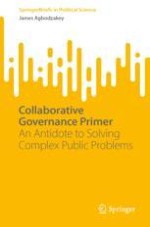Abstract
Outputs and outcomes reflect cross-sector stakeholders’ purpose and attendant efforts in tackling complex public problems for society through collaborative governance. The challenges that complex problems present in the various areas, such as health and human services, environment, climate change, crime, water crisis, economic development, national security, and terrorism, demand intentional collective decisions and actions through collaborative governance to enable constructive and sustainable solutions. The convergence of public, private, nonprofit, and civic sectors and stakeholders in collaborative governance coupled with regular engagement in result-oriented collaborative forums usually culminates in outputs that translate into categories of services or actions with associated tangible and intangible outcomes for the greater good. Thus, whether the outputs are decisions such as allocation priorities, strategic or comprehensive plans, number of clients served, collaborative forum engagement-related committee tasks, or evaluation results, the outcomes could be reflected in health, community wellbeing, responsive public service delivery, resiliency, sound natural resources management, effective climate action, continuous improvement, and others. The reality of collaborative governance, though, especially the complications of the collaborative process, could somewhat negate or delay prompt stakeholders’ efforts. However, their collective resolve helps to work toward outputs and outcomes with extensive benefits. This chapter relates the concepts of outputs and outcomes in a collaborative governance context while referencing the elements, a health service case, and a proposed intervention case as essential additions to promote relevant competencies.
